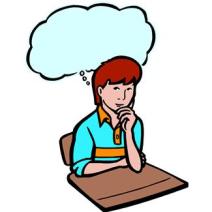 My AtoZ theme is how to pursue an interest in family history/genealogy – I’d love you to join me on the journey.
My AtoZ theme is how to pursue an interest in family history/genealogy – I’d love you to join me on the journey.
Q is for QUESTIONS
When you’re researching, you always need to have your thinking cap on and question yourself and your sources.
- Is this oral history accurate? Can I get some confirmation from other independent sources? Having said that, there’s nothing like hearing someone’s memories recorded in sound or writing.
- What is this document telling me? What’s the background or reason why it was created?
- What government legislation applied at the time?
- Were the country/county/state/council/town boundaries the same at the time we’re interested in or have they changed?
- What significant external events affected your family?
- Did they have any major personal challenges to deal with?
- Why did they emigrate?
- Did they travel alone or with other family or friends?
- Did they bring family out after them in chain migration?
- Is your family typical of their peers at home or those who emigrated?
 And on and on it goes. The questions will lead you to other resources and back to more questions. I did say family history is life-long learning <smile>.
And on and on it goes. The questions will lead you to other resources and back to more questions. I did say family history is life-long learning <smile>.
An academic once said to me “what’s your question?” and I confess I looked somewhat blankly at him. It wasn’t that I hadn’t been asking questions, just that I hadn’t articulated it that way.
What other questions would you ask?
Thank you for visiting me on this journey. I love comments <smile>
There’s a plethora of reading choices on this year’s A to Z Challenge, so my challenge to you is to visit the sign-up page and select one (or more) blogs to read between the numbers 1800-1924.
Family stories are certainly not to be believed. My great great grandparents came out from Scotland with the story that she was the daughter of a wealthy family who fell in love with her art tutor and eloped. It seems she was a maid and he worked as a seaman. One thing is true. He was an artist as I have seen one of his paintings. Coming to a new country gave people the opportunity to reinvent themselves so their stories are worth recording, if only to compare with the truth.
LikeLiked by 1 person
And how they perceived themselves in a “romantic” light. I only have a couple of family stories and they’ve not been far from the truth. My husband’s family stories, on the other hand….;)
LikeLike
It appears to be true that one ancestor drove the first mob of cattle across the Murray from NSW to Victoria. Whether he was subsequently drowned or gored to death by a bull is less certain.
We KNOW that the one-legged ancestor who was a drummer boy at the battle of Waterloo is pure fiction, but it’s a fun story, isn’t it?
LikeLiked by 1 person
Some Trove searching in order for the goring?
As to that drummer boy…
LikeLike
These questions are great for reminding us of the context of our ancestors’ lives. Thanks, Pauleen.
LikeLiked by 1 person
Thanks for commenting Maria 🙂
LikeLike
The foundation of the technique of critical analysis is to apply the questions who? what? how? where? why? to every fact or observation. Having done it for most of my working life it is now automatic to me but when I started doing family history it took a while for me to apply this. I think in the beginning you tend to take documents and stories at face value. You soon learn though.
LikeLiked by 1 person
Sounds like you had a valuable skill when you started on this journey.
LikeLike
I have found most family stories to be true, but often with a little twist – a different generation or taking place in a different state. They were invaluable in pointing me towards the real facts to be found in the records.
Finding Eliza
LikeLiked by 1 person
I suspect much depended on the family and mostly I can make sense of mine too.
LikeLike
Congrats on finding a letter Q word for this post. My letter V post will be about a family story that I investigated, which turned out to be true. The family sources were reliable, but questioning what they told me and following up led to a wonderful discovery.
Molly of Molly’s Canopy
http://mollyscanopy.com/
LikeLiked by 1 person
I’ll look forward to it! V is for Verify?
LikeLike
I find there is usually a grain of truth most stories. It is just to separate that grain from the rest. Even my mom – she told me stories when I was a teenager and now she tells the same story differently! Is it her or I who doesn’t remember correctly??
I have questions abut a few of my ancestors – I found a story in the newspapers and was so excited but going over all the material again I am questioning the timeline. Is it him or another family all together!
Like you said the more answers you get the more questions you have,
LikeLiked by 1 person
If we want answers we must have questions.
LikeLiked by 1 person
Seems obvious doesn’t it? Yet, that academic threw me at the time.
LikeLike
Writing the questions down is something I need to do so I focus my research.
LikeLiked by 1 person
Do as I say not as I do 🙂
LikeLiked by 1 person